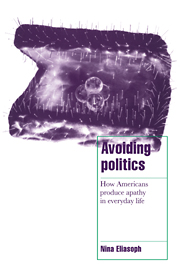Book contents
- Frontmatter
- Contents
- Acknowledgments
- 1 The mysterious shrinking circle of concern
- 2 Volunteers trying to make sense of the world
- 3 “Close to home” and “for the children”: trying really hard not to care
- 4 Humor, nostalgia, and commercial culture in the postmodern public sphere
- 5 Creating ignorance and memorizing facts: how Buffaloes understood politics
- 6 Strenuous disengagement and cynical chic solidarity
- 7 Activists carving out a place in the public sphere for discussion
- 8 Newspapers in the cycle of political evaporation
- 9 The evaporation of politics in the US public sphere
- Appendix 1 Class in the public sphere
- Appendix 2 Method
- Notes
- References
- Index
- Titles in the serious
1 - The mysterious shrinking circle of concern
Published online by Cambridge University Press: 17 November 2009
- Frontmatter
- Contents
- Acknowledgments
- 1 The mysterious shrinking circle of concern
- 2 Volunteers trying to make sense of the world
- 3 “Close to home” and “for the children”: trying really hard not to care
- 4 Humor, nostalgia, and commercial culture in the postmodern public sphere
- 5 Creating ignorance and memorizing facts: how Buffaloes understood politics
- 6 Strenuous disengagement and cynical chic solidarity
- 7 Activists carving out a place in the public sphere for discussion
- 8 Newspapers in the cycle of political evaporation
- 9 The evaporation of politics in the US public sphere
- Appendix 1 Class in the public sphere
- Appendix 2 Method
- Notes
- References
- Index
- Titles in the serious
Summary
A puzzle: “close to home”
Lisa, a volunteer with an anti-drugs group, circled over and over again to the topic of the local nuclear battleships base during an interview with me:
There's probably at least four battleships over there at all times. You can see them … they're black, and there's scaffolding on them and stuff … They're dangerous … scary … I mean, half those shipyard workers are on dope all the time. It makes me nervous. There's a park on the top of the hill. They come up and smoke dope at lunch and go back to work on the battleship. They have spills quite often. I mean, we don't know about it, but my husband was on a battleship working, so I know.
Another interviewee, Carolyn, lived closer to the base. A chemical plant just upstream from her had had a huge spill a few months earlier; oil lapped up onto her house, which jutted out on stilts over the bay. “The beach was covered with oil. You could see it on the rocks and in the water. It was sad, ” she told me as we sat at her kitchen table with her eighteen-year-old son, in front of a picture window with an eye-level view of the nuclear battleship base and the glimmering bay, under a big sky of rainclouds streaked with sunlight. Every twenty minutes or so a battleship slipped by.
- Type
- Chapter
- Information
- Avoiding PoliticsHow Americans Produce Apathy in Everyday Life, pp. 1 - 22Publisher: Cambridge University PressPrint publication year: 1998

